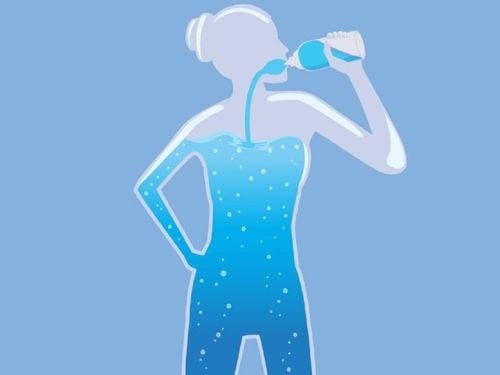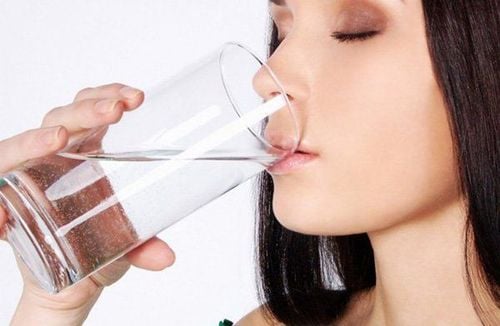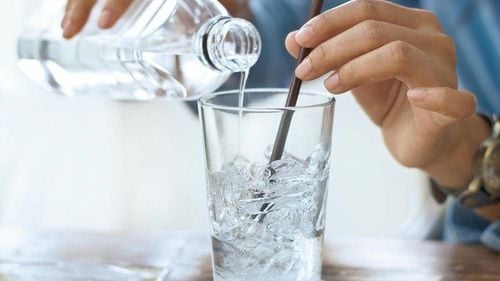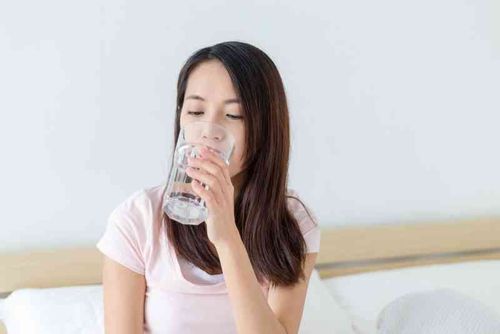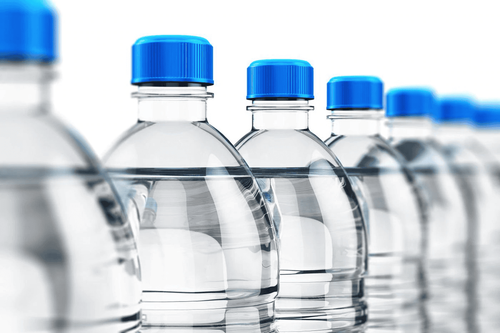This is an automatically translated article.
Drinking water is an indispensable part for our body. However, not everyone understands the composition of water. So what does each glass of water we use have? Drinking water helps you absorb what nutrients for the body?
1. H2O atom in drinking water
We all know the structure of the water molecule in the form of H2O. That is, 2 H atoms combined with 1 O atom. This compound according to analytical research is said to account for about 75% of the body weight. Depending on age, the proportion of water in the body will change.
When drinking water is introduced into the body, it has the ability to break down the nutrients that we took in before. At the same time, water is also a conductor that helps nutrients move quickly and provide the body where it needs to be. When drinking water regularly every day, you will not worry about lack of water and the amount of salt in the body is kept in balance. Not only that, the activities of bone and joint tissue are also protected against injury.
2. The composition of water is more than you think
When you use water to wash clothes... we rarely pay attention to how pure they are. However everyone on this Earth is drinking water that is at risk of being poisoned and containing a lot of heavy metals. Typical of these impurities can be mentioned: Pesticides, wastewater, lead, mercury ..... Because water is present in all countries and can neutralize many things, water purification is extremely important. necessary to ensure safe drinking water for health.
3. Composition of well water
Water from wells has been a source of daily living for many generations. Recently, under studies analyzing the composition of water, it has been shown that this untreated water source is easily contaminated with toxic substances that are harmful to human health.
In localities, testing of impurity concentration in water has not been done tightly. Therefore, people may be using water containing many toxic substances and countless species of disease-causing bacteria. Subjects such as children, the elderly, pregnant and lactating women with low resistance when drinking unsafe water will be threatened with health.
To minimize the unwanted effects of polluted water, we need to regularly check and analyze water samples. Thanks to that waste in the water is eliminated, you can avoid the risk of diarrhea, exhaustion.....
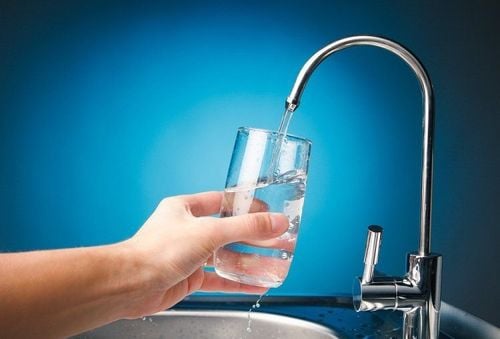
Để hạn chế tối đa sự ô nhiễm nước uống, chúng ta cần thường xuyên kiểm tra phân tích mẫu nước.
4. Drinking water contains fluoride
Water contains fluoride, a heavy metal that does not need to be removed. This is a substance that has the ability to improve oral health and effectively fight tooth decay. However, after the process of filtering and removing harmful substances, fluoride is also retained, causing the water to lose a lot of useful minerals for the body.
5. Salt in water has an effect on you
Sodium or potassium in water can provide a amount of salt for the body. However, this substance should not be absorbed in excess because you already get enough from food in each daily serving. When you tolerate too much salt, you will increase your risk of high blood pressure, congestive heart failure.... Therefore, it is necessary to regularly check the concentration of salt in the water or salt deposited in the warm mouth or the mouth of the bottle to make sure. they are not so much.
6. Drinking water contains arsenic
Arsenic is often considered a toxic substance that threatens human psyche. However it is also an ingredient in water. Chemically it is a naturally occurring chemical and exists in small amounts in our daily water supplies.
For natural sources of water, testing for amethyst is important for protecting the health of every citizen. With the allowable level you can use that water as usual. However, if the concentration of amethyst in the water is too high, you will increase the risk of heart disease, diabetes, cancer or reduce the ability of children's brain development.
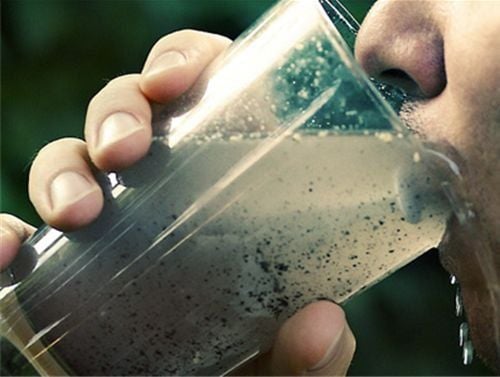
Thạch tín là một loại hóa chất có trong tự nhiên và tồn tại lượng nhỏ trong nguồn nước uống của chúng ta.
7. Lead exists inside every cup of water
Lead-contaminated water is a bad thing for each of us. This fault usually occurs due to corrosion of old corroded water conductive materials. Lead will leach into your water supply and reach your faucet if we don't detect it early and stop it.
Although the water plant performs the function of filtering and disinfecting water, there are many causes of lead-contaminated water. To ensure the safety of your family and your own health, you should use a water purifier and regularly check the pH of the water to ensure the quality of each use.
8. Disinfectant cleaners
Chlorine is a detergent used to clean harmful microorganisms in water sources. There are many chemicals used but chlorine is used quite commonly. At the same time, this is also a chemical that is analyzed to have a safe level and does not have a strong odor that is less uncomfortable for users.
9. Use a water filter system to retain minerals in the water
Handling harmful ingredients in water is a way to protect the health of each of us. The water purifier will prevent the penetration of large-sized impurity bacteria from entering the domestic water source. However, fluoride is a heavy metal that, if absorbed in sufficient amounts, has a beneficial effect on oral health. Therefore, a smart filter device capable of removing harmful impurities and retaining minerals in the water is what we need.
10. Safety of bottled water
The composition of bottled water is often rigorously tested before being sold on the market. Therefore, these products are quite safe for users. However, a common disadvantage between bottled water and factory water is that it filters out fluoride to protect teeth. In addition, bottled water is quite expensive, so it should be considered before using.
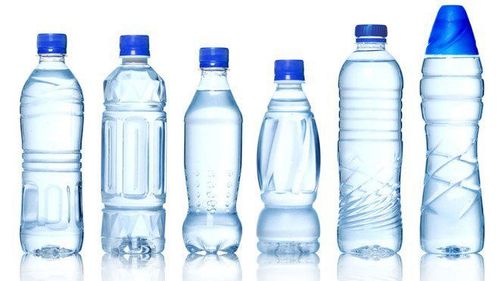
Nước uống đóng chai khá an toàn cho cho người sử dụng.
11. Is there any difference in the composition of water when boiled?
Natural water may not contain too many harmful impurities, but after incidents such as broken pipes and flooding, more impurities will enter the water. So you should use boiled water for your own safety and health.
Moreover, water after boiling at 100 degrees Celsius will remove bacteria that are harmful to health. That's why health organizations always recommend using boiled water to protect your health.
12. Disinfect water before use
Water bleaching is a method to disinfect harmful bacteria or impurities found in well water. Each time the method is applied, only 6-8 drops are needed because using too much disinfectant will increase the toxicity in the water.
Bleach can reduce the pollution level of water sources. At the same time, this substance does not change the color of the water and the scent is milder than common detergents.
Our drinking water contains a lot of ingredients from beneficial to harmful. However, to filter out harmful substances will also affect some minerals in the water that are beneficial to health. Therefore, the method of removing impurities and retaining valuable natural nutrients is the aim of the researchers.
Above is information about some components of water for your reference. If you suspect that the water source is being used, you can bring the sample to the scientific institute to request testing and analysis of the composition.
Please dial HOTLINE for more information or register for an appointment HERE. Download MyVinmec app to make appointments faster and to manage your bookings easily.
Reference source: webmd.com



